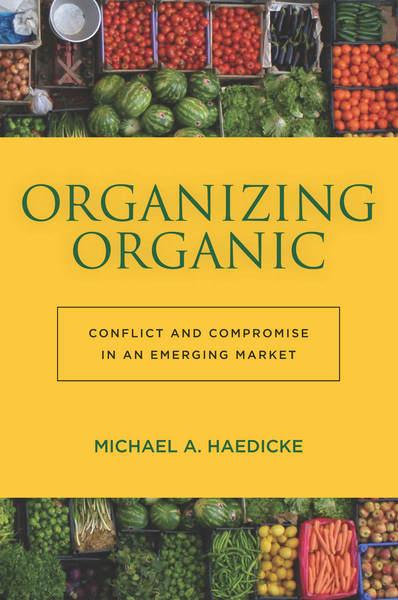New Book Examines Conflict, Compromise in Organic Food Industry

A new book by Drake University Associate Professor of Sociology Michael Haedicke explores how farmers, small business owners, regulators, and other stakeholders navigate conflict in the organic food industry.
“Organizing Organic: Conflict and Compromise in an Emerging Market” (Stanford University Press, 2016) leverages 10 years of research to explain how key players balance competing narratives within the industry: one that positions organic farming as a social and political movement poised to shake up big, traditional agricultural institutions; and another that emphasizes organic food’s potential for market growth and profit.
“Some individuals within the organic food movement are saying, ‘big businesses are bad, we’re losing the purity of organics, we’re losing the spirit of organics and what it’s supposed to mean,’—while others are saying, ‘the organic industry is (and should be) growing, and everyone who feels otherwise is holding us back,’” said Haedicke. "One of the accomplishments of this book is to present both perspectives, and to explain where both are coming from, without saying who’s right and who’s wrong."
The book comes at a time when major food retailers like Whole Foods Market, Trader Joe’s, and even Wal-Mart strive to grasp a larger share of the organic food market, leaving many within the industry to wonder how they can compete while preserving their ideals. Small-scale farmers and alternative businesses like organic foods co-ops balance moral and ethical standards against practical concerns like pricing, inventory, and consumer demands.
“Organic food co-ops were historically tied to the social and political movements of the 1960s, which prized collective interests and participatory democracy,” Haedicke said. “Today these same co-ops compete with businesses that sell organic foods to maximize shareholder profit. They have to compete in a market that’s not of their own making on terms that are not those they would prefer. They work to create compromises that allow them to remain in business in one hand, and stay true to their ideals in another. "
This tension—between organics as a social movement and an economic force—has existed since the industry’s inception. But unlike some other researchers, Haedicke argues that conflict is not inevitable nor unmanageable; he points to areas of compromise between stakeholders.
On a national scale, the U.S. Department of Agriculture’s National Organic Program was designed to enable and encourage market growth, but it also incorporates democratic elements that make organic foods regulations relatively transparent and participatory. The National Organic Standards Board, a 15-member stakeholder advisory board, guides the United States Department of Agriculture on content of organic regulations.
“You might contrast that with mainstream food regulation, where consumers don’t really know what’s going on with the ins and outs of food safety regulations, and they don’t have a formal say in the development of those regulations,” Haedicke said.
On a smaller scale, owners of organic food stores strive to source local and all-natural products, but may find themselves making exceptions when supply shipments run late, or when customers request items that don’t traditionally meet the store’s standards. For example, he cites a co-op manager who stocks Karo syrup—a non-organic product—during the Thanksgiving season, when customers demand it as part of their holiday shopping.
Haedicke interviewed more than 60 people during the course of his research. He also relied on a variety of unique archival sources to complete the book, which he began as a graduate student at the University of California, San Diego and completed while a faculty member at Drake. More information is available through the Stanford University Press website.







